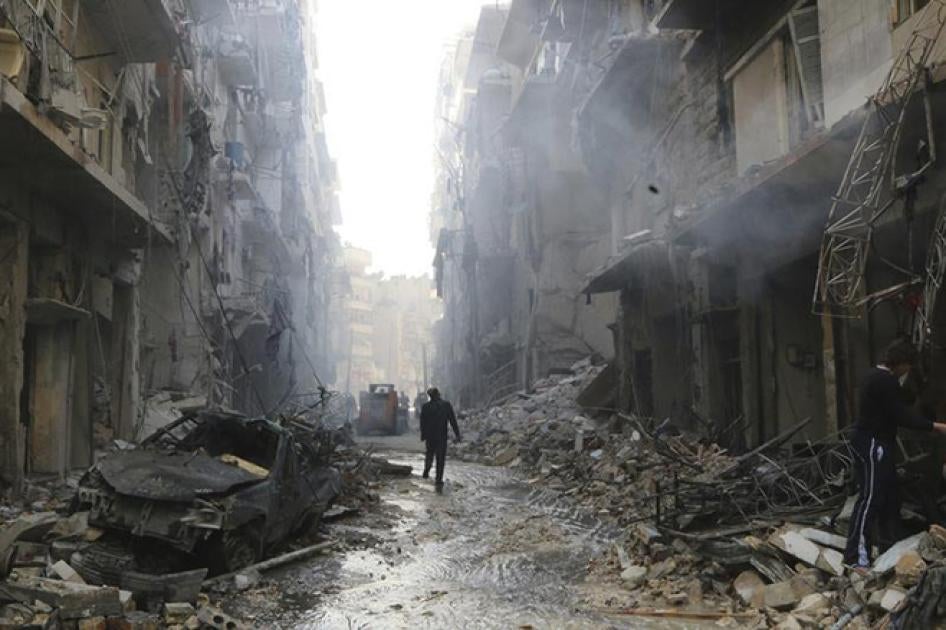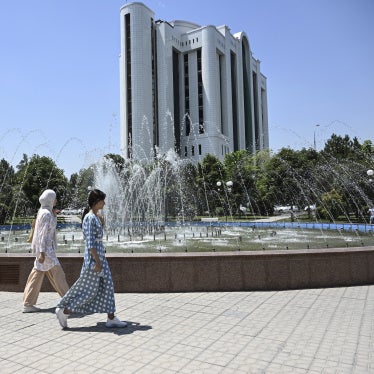GAZIANTEP, Turkey — As the self-proclaimed Islamic State, or ISIS, commits horrendous videotaped executions, it might seem to pose the greatest threat to Syrian civilians. In fact, that ignoble distinction belongs to the barrel bombs being dropped by the military of Syria’s president, Bashar al-Assad. The Islamic State has distracted us from this deadly reality.
Barrel bombs are improvised weapons: oil drums or similar canisters filled with explosives and metal fragments. They are dropped without guidance from helicopters hovering just above antiaircraft range, typically hitting the ground with huge explosions and the widespread diffusion of deadly shrapnel. They pulverize neighborhoods, destroy entire buildings and leave broad strips of death and destruction.
The Syrian military has dropped barrel bombs, sometimes dozens in one day, on opposition-held neighborhoods in Aleppo, Idlib, Dara’a and other cities and towns. They have pulverized markets, schools, hospitals and countless residences. Syrians have described to me the sheer terror of waiting the 30 seconds or so for the barrel bomb to tumble to earth from a helicopter hovering overhead, not knowing until near the very end where its deadly point of impact will be.
From the start of the war, the Assad government has pursued a murderous policy toward Syrian citizens who happen to live in areas that have been seized by opposition armed groups. The apparent aim is to kill and terrorize civilians (and destroy civilian structures) so as to drive civilians from opposition-held areas and to send a warning of the misery that attends anyone whose neighborhood is taken by opposition groups. Mr. Assad is thus pursuing the “total war” strategy that the Geneva Conventions and the laws of war flatly prohibit and criminalize.
Beyond killing civilians, barrel bombs are playing a big part in forcing Syrians from their country. In most wars, civilians can find a modicum of safety by moving away from the front lines. But Mr. Assad’s indiscriminate use of barrel bombs deep in opposition-held territory means that for many there is no safe place to hide. That ugly reality has played a major part in persuading four million people to flee the country.
Yet the international community has made little effort to stop Mr. Assad’s barrel bombing of civilians. The two governments with the greatest potential to influence Mr. Assad — his principal backers, Russia and Iran — have refused to get him to stop. Western governments have been reluctant to exert strong public pressure on them because of other priorities — Ukraine, in the case of Russia, and the nuclear deal, in the case of Iran. The European Union is putting far more effort into stopping Syrian asylum seekers from reaching the Continent than addressing the root causes of their flight. The United States and Turkey recently announced a plan to make a 60-mile strip in northern Syria an “ISIS-free zone,” but the goal is to fight ISIS militants, not protect civilians.
In February 2014, the United Nations Security Council demanded an end to the “indiscriminate employment of weapons in populated areas, including shelling and aerial bombardment, such as the use of barrel bombs,” but it has not done much to stop it. Western governments are now proposing a new Security Council resolution that would have the United Nations monitor the use of barrel bombs and that hints at, though does not actually impose, sanctions should the barrel bombing continue.
If Russia blocks further Security Council action, Western nations should start ratcheting up public pressure on Damascus for using this indiscriminate form of warfare and on Moscow and Tehran for backing it.
Because of Western reticence, too few people understand the extraordinary slaughter that the Syrian military is committing with its barrel bombs. Mr. Assad’s chlorine gas attacks, terrifying as they are, kill a tiny fraction of the barrel-bomb toll, though they have recently attracted more attention than the barrel bombs.
Western nations should also continue to collect evidence of Syrian war crimes, and if Russia persists in blocking the International Criminal Court from having jurisdiction to pursue war-crimes charges, an alternative tribunal should be found.
One reason for soft-pedaling is a fear that ending the barrel-bomb attacks might undermine Mr. Assad’s ability to cling to power, and thus facilitate an Islamic State takeover. But barrel bombs are so imprecise that the Syrian military does not usually drop them near the front lines, for fear of hitting its own troops. They are useful mainly for pummeling civilian neighborhoods.
That is one reason residents of opposition-held parts of Aleppo told me that, unlike in almost any other war, some civilians have — astonishingly — moved closer to the front lines, preferring to brave the more predictable artillery and snipers than the barrel bombs’ random death from the sky.
The failure to address the barrel bombs arguably helps extremist groups like the Nusra Front and the Islamic State, which recruit Syrian members by presenting themselves as the most powerful military force to counter Mr. Assad’s government’s atrocities.
President Obama has reportedly been reluctant to act too decisively in Syria for fear that he might then “own” the country and the chaotic mess it has become. But firmer pressure on Syria, Russia and Iran to stop the barrel bombs wouldn’t make the United States responsible for anything other than fewer civilians dead, injured and displaced.
Some say that, rather than targeting a particularly monstrous weapons system, the best way to end the barrel bombs is to make peace. That is a laudable goal, but few believe a negotiated solution to the Syrian crisis is anywhere near. In the meantime, virtually all the Syrians I have spoken with agree that stopping Mr. Assad’s barrel bombs is probably the single most urgent task to reduce their suffering now.
Kenneth Roth is the executive director of Human Rights Watch.










